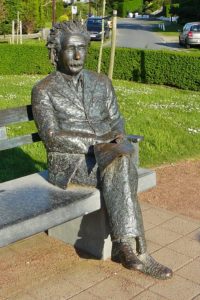Albert Einstein spent his life working towards being the renowned scientist he became at his death. Einstein was born Jewish, at age 11 practiced Judaism with a fervor, by his teens he was a non-practicing Jew. He lived his life striving to be a scientist, struggling with finding his place in the world. When questioned about his religious beliefs explained the mysticism of science as the existence of God. In an interview when asked if he was an atheist answered no, he was not in favor of atheism.
An atheist by definition lacks the belief in a god or gods, while an agnostic does not feel there is proof of a god or gods.
For Albert Einstein the belief in God was not as important as the moral behavior of people, rather he demonstrated admiration for a few religions. Adherent’s article quotes his thoughts in a letter written in regards to the Quakers and the Christian Science church. One quote is from a letter he wrote to Hans Muehsam dated March 30, 1954, in which he referred to himself as an agnostic, to be of good consciousness, behave in a manner of morality and hold to higher principles one does not need a “law-giver who works on the basis of reward and punishment.” (Adherents: Einstein Archive 59-215)
 Einstein discussed the existence and development of religion beginning with early man to the then-current “priestly castes,” political powers, and common needs of the populace. His discussion includes the precepts of the Jewish religion and reflecting on the progress from fear to moral religion. Einstein warned that one must be on the lookout for the prejudice against fear-based religions, yet seeing that all religions were a blend of moral and fear-based. He continued to explain that the unified ground of all religions is what he termed as the anthropomorphic concept of God. The ultimate ideal of Einstein’s thought in this one letter is that science is responsible for awakening and transmitting the “cosmic religious feeling.” (Albert Einstein: Religion & Science)
Einstein discussed the existence and development of religion beginning with early man to the then-current “priestly castes,” political powers, and common needs of the populace. His discussion includes the precepts of the Jewish religion and reflecting on the progress from fear to moral religion. Einstein warned that one must be on the lookout for the prejudice against fear-based religions, yet seeing that all religions were a blend of moral and fear-based. He continued to explain that the unified ground of all religions is what he termed as the anthropomorphic concept of God. The ultimate ideal of Einstein’s thought in this one letter is that science is responsible for awakening and transmitting the “cosmic religious feeling.” (Albert Einstein: Religion & Science)
Einstein does not denounce religion or God in any of his letters or lectures. He does, however, continue to contribute science with the ultimate responsibility of keeping the “feeling” of the presence of a god awake in individuals. Einstein states: “I maintain that the cosmic religious feeling is the strongest and noblest motive for scientific research.” (Albert Einstein: Religion & Science)
To give Albert Einstein an atheist profile is a misnomer, to say the least, from his letters it is clear he does not lack the belief in a god, but rather seeks to find the resource, proof, or demonstration that there is a god. It would seem that as a non-practicing Jewish man he developed a scientific view of God, rather finding the sense of God, not physical proof. His faith was in science bringing the “feeling” to others through research, always seeking the uniform field theory. In this regard, many have considered him either an agnostic or atheist, despite the many papers Albert Einstein wrote under the title “Religion and Science.”
Other Resources regarding Albert Einstein include an article by Times Magazine discussing his views on faith.






